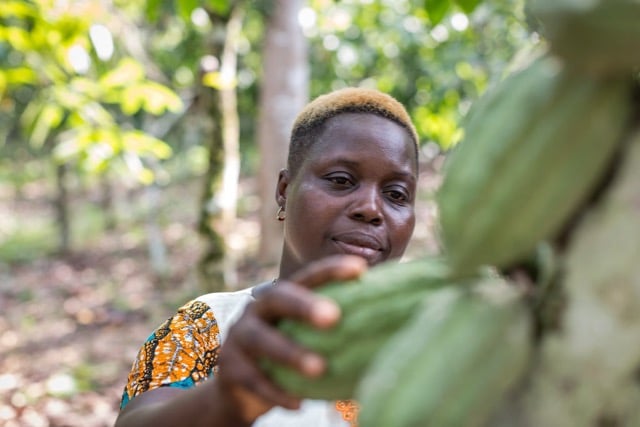New research from the Fairtrade Foundation looking at the plight of women cocoa farmers – who make up two-thirds of the labour force in the industry – has shined a light on the fact that many face an even worse situation than their male counterparts.
The Chocolate’s Invisible Women report marks the beginning of this year’s Fairtrade Fortnight and the second year of the Fairtrade Foundation’s She Deserves a Living Income campaign, which highlights the exploitation experienced by female farmers.
The report found that on average women in the sector earn just 23p a day, far below the extreme poverty line of £1.40, and that 75% don’t own their land, meaning they miss out on help to escape poverty.
After working on cocoa farms – where they perform 68% of the work, including weeding, preparing the land, planting seedlings, tending trees right through to harvesting, fermenting, drying and bagging the beans – women still have to return home to face doing most of the household work. The report says that, combining this with the farm work, it means women work 30% more than men.
If the cocoa industry is serious about a long-term sustainable future for their business then they must truly sweeten the deal and invest more in the women behind our chocolate
“It takes two to grow cocoa, it’s a partnership crop that needs both the man and the woman to successfully see it through to harvest,” says Louisa Cox, director of impact at the Fairtrade Foundation. “Yet often the woman does two-thirds of the work for less than a third of the income, meaning a bitter taste to the sweet treat.”
“If the cocoa industry is serious about a long-term sustainable future for their business then they must truly sweeten the deal and invest more in the women behind our chocolate.”
The foundation is calling on the UK Government and chocolate companies to join a new international initiative, Alliance on Living Incomes in Cocoa by the end of 2020 and support human rights due diligence legislation in Cocoa. It is also urging companies to pay living incomes to cocoa farmers by 2030 to meet the UN’s global goals to end poverty.
Cox concludes: “With only ten years left, the ambitious goals and targets to end poverty, support small-scale farmers and decent work for all enshrined in the Sustainable Development Goals will not be met unless urgent action is taken to support these invisible women. It’s high time we stood side by side with these invisible women and call time on the gender pay gap in chocolate.”
Image credit: Chris Terry





